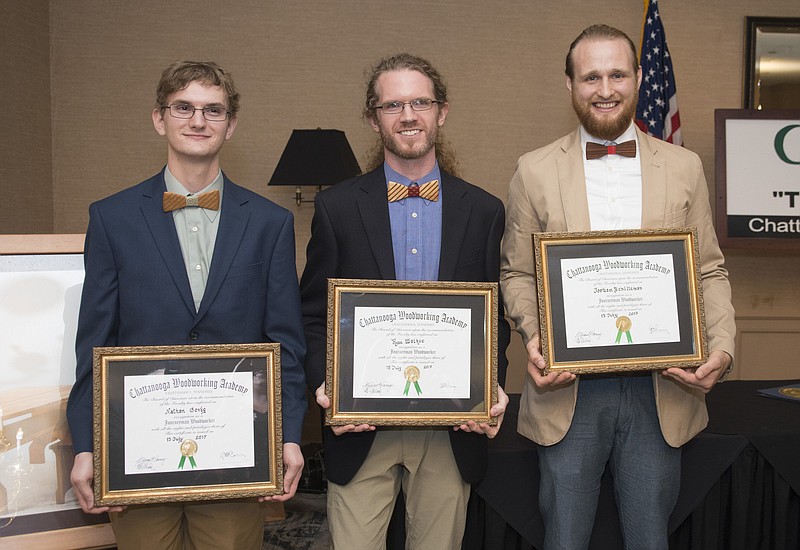As the first graduating class of the Chattanooga Woodworking Academy, three students are prepared to craft a future producing the highest quality of woodwork. Surrounded by dignitaries, instructors, friends and family, Jordan Schilleman, Nathan Govig and Ryan Walker were featured in a ceremony in mid-July where they received certificates licensing them in woodworking.
While job opportunities vary for professional woodworkers, the national employment rate for the occupation is rather low. According to the Bureau of Labor Statistics' 2016-17 Occupational Outlook, 237,200 people possess jobs as woodworkers in the United States.
"There's a real lack of skilled hand-craftsmen in the world, especially in our country, and these graduates have a lot of opportunity to go into a variety of occupations that are related to woodworking, such as architects, designers and project managers," said Bill Carney, director and founder of the school. While a career as a woodworker can take as little as a high school diploma and on-the-job training, CWA's Master Woodworker course also prepares students for such highly qualified spinoff professions, he explained.
The program takes four years to complete with around 12 hours of instruction per week.
"I'd like to say when they walk into any woodworking shop anywhere in the world, they'll probably be one of the most knowledgeable and skilled people in the business from day one," Carney said of his graduates.
Preparing students to take on careers in woodworking, CWA includes education in design, drafting and woodworking skills such as cabinetry, furniture making and commercial mill work. Prospective students are expected to have a general aptitude for creativity, professionalism and, of course, the desire to work with wood.
"There is a lot of control and self-discipline involved in a trade like woodworking," said Walker, who is already instructing others in basic woodworking at CWA. "It allows me to be creative while working with my hands, so I'm in control of the design and quality of the work I do."
Courses in business, advertising and marketing are also included in CWA's lesson plan, as many professional woodworkers decide to begin their own business. While assisting at CWA, Walker is also working on creating his own wood shop, and entrepreneurship is something he finds attractive.
"I'm responsible for my own income, and I don't have to worry about getting fired or getting laid off because I am my own boss," he said. "If I'm not making enough money, it's my own fault. The good thing is that I can hustle and I can go out and ramp up my own income if I need to."
Fellow graduates Schilleman and Govig are currently working at Richards, Fowkes & Co., a successful local pipe organ building company. They began working at the Ooltewah organ-maker while attending CWA, and plan to continue with the company to grow their skillsets, however, like Andrews, potential as entrepreneurs is there for them as well.
Although classes are very small (usually around six to seven begin the program each year), the CWA strives to have a varied student body. The current class of students hail from nine different states and one foreign country, and the incoming class is 50 percent female, a first in CWA history, said Carney.
"We welcome anybody," he said. "We don't discriminate on any basis. We are looking for a diverse student body."

